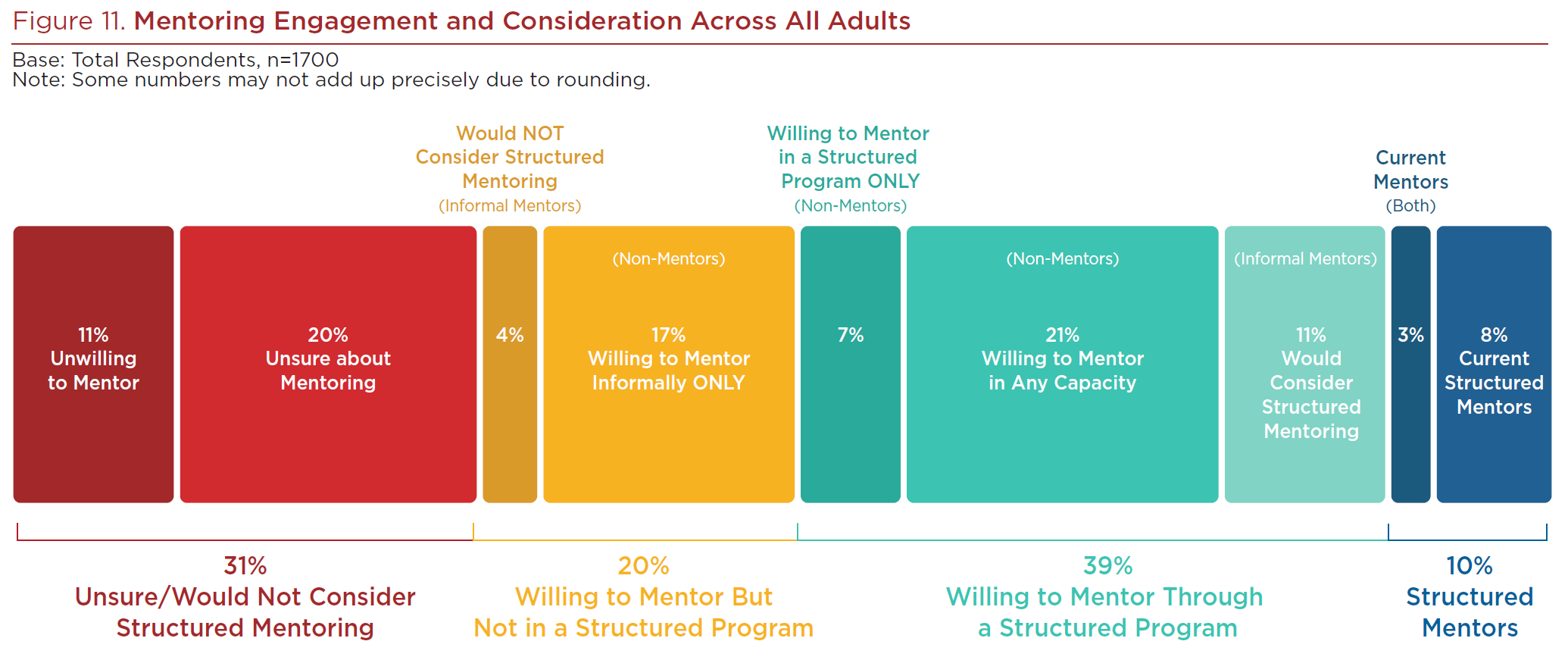
MENTOR: The National Mentoring Partnership
.
A quarter of American adults are actively engaged in mentoring young people, and far more would be interested if they had more information on mentoring opportunities, a new study reports.
The research, sponsored by MENTOR: The National Mentoring Partnership, also found that the most promising route to increase mentoring activity could be persuading employers to sponsor programs.
MENTOR undertook the project to understand adult attitudes toward mentoring young people and “drive strategies for the mentoring movement,” said Erin Souza-Rezendes, the organization’s communications director. The organization does research, sets standards and provides tools to mentoring groups around the country.
Previous efforts to measure mentoring participation used data from the Current Population Survey, sponsored by the U.S. Census Bureau and Bureau of Labor Statistics. Analyses of that data found that rates of volunteer mentoring held steady at about 1 percent of the population between 2006 and 2015. However, that research considered only adults volunteering at least 36 hours per year in formal programs where their main activity was mentoring.
The MENTOR survey aimed to capture a fuller picture, asking a statistically representative sample of adults about informal mentoring as well as participation in structured programs. About 10 percent of respondents said they had mentored at least one young person in a structured program in the last year, while 18 percent reported participating in at least one informal mentoring relationship.
Only 4 percent of “structured” mentors were participating in a program labeled as such. Many more reported mentoring through other youth development programs, such as after-school and tutoring programs (37 percent), in workplace-related initiatives (21 percent), hobby and recreational organizations (21 percent) or faith-based organizations (16 percent).
“Often we think of formal mentoring, one-on-one matching programs,” Souza-Rezendes said. “We found that mentoring is happening in various places and settings and in different ways.”

Why people don’t mentor
More affluent respondents were more likely to be involved in mentoring, as were people with children in the home and those who were mentored themselves as youth. Those findings are consistent with earlier research, but the new study, “The Power of Relationships,” found a higher percentage of male participants, especially in structured programs.
In addition to the 25 percent of respondents who said they are currently involved, another 45 percent said they would be willing to serve as mentors, indicating a lot of untapped capacity.
Several of the reasons most often cited for not participating “are related to a lack of information: 26 percent don’t know how to get involved, 22 percent believe there are no local opportunities, and 8 percent are simply waiting for someone to ask them,” the report said.
“Grassroots recruitment is important. We have to find people where they are,” Souza-Rezendes said.
The barriers to involvement cited most by nonparticipants were a lack of time due to the demands of work and family.
Another section of the report points to employer involvement as possibly the most promising route of all.
A full 74 percent of people who said their employer was involved in supporting mentoring reported participating, as compared with 25 percent of those whose employers were not involved. When nonmentors were asked what factors would encourage them to participate, 72 percent cited paid time off from an employer.
When an employer does not directly support mentoring, employees who do mentor are more than three times likely to do so informally, not in a program, the study found. When an employer does support mentoring, “not only does it increase structured mentoring, it also increases the amount of informal mentoring that their employees do,” the report said.
“Clearly, in light of this research, employers can play a pivotal role in fostering a culture of mentoring for adults, and bringing more mentoring to all youth across the nation,” the report said. “They can triple the rates of mentoring.”
When an employer supports mentoring, employees’ opinion of the value of mentoring increases, as does their support for funding those programs. And the report found statistically significant increases in career and job satisfaction among employees of companies that support mentoring, a correlation that exists whether or not the individual employee mentors.
“We think this shows that doing good can help employees do well,” Souza-Rezendes said. “I think there’s a real opportunity here for building a mentoring mindset in organizations.”































